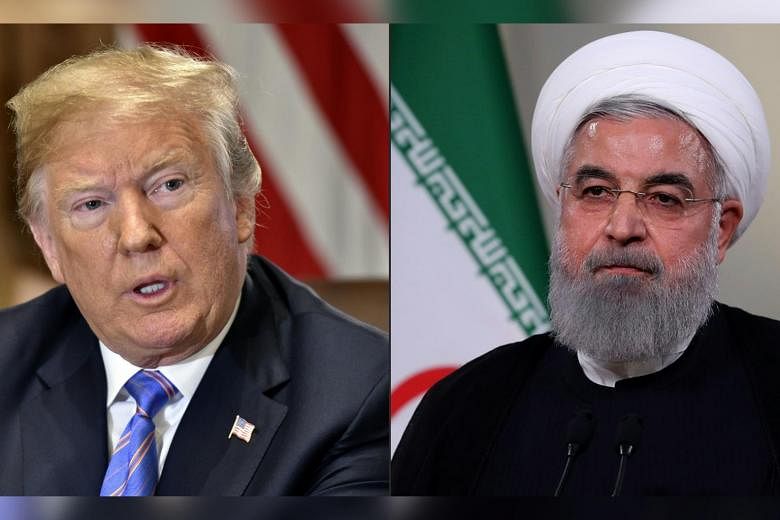NEW YORK (BLOOMBERG) - The leaders of France and the UK urged Iranian President Hassan Rouhani and US President Donald Trump to meet on the sidelines of the UN General Assembly in what appeared to be rapid-fire shuttle diplomacy aimed at easing tensions and possibly bringing the two leaders together.
French President Emmanuel Macron met separately with both Mr Trump and Mr Rouhani into the evening on Tuesday (Sept 24) as he continued to press for negotiations between the two antagonists on his final day at the United Nations. It was his second meeting with Mr Rouhani in 24 hours.
"If he leaves the country without meeting with President Trump this is a lost opportunity," Mr Macron said of Mr Rouhani, according to comments provided by UK officials.
"Because he will not come back in a few months. And President Trump will not go to Teheran, so they have to meet now."
UK Prime Minister Boris Johnson, who met with Mr Trump earlier on Tuesday, echoed his French counterpart's remarks, saying, "I agree with Emmanuel. You need to be on the side of the swimming pool and jump at the same time."
It wasn't clear if Mr Trump was encouraging the diplomatic overtures. Earlier in the day, he said he had not yet agreed to meet with Iran.
But a face-to-face meeting would be historic, the first in more than four decades between the leaders of the US and Iran.
"They're here, we're here, but we have not agreed to that yet, but they would like to negotiate," Mr Trump told reporters in New York.
"And it would certainly make sense, but we have not agreed to that yet."
On Monday, he said the US didn't need a mediator, saying "they know who to call".
The White House declined further comment on Tuesday about a potential meeting, or Mr Macron's efforts.
Mr Macron sought to broker a breakthrough between the US and Iran when he hosted the Group of Seven summit in France last month, winning verbal support from Mr Trump for a proposal extending a US$15 billion (S$20.64 billion) credit line to Teheran. But then no agreement was reached.
In his speech to the UN on Tuesday morning, the US leader said Iran had "blood lust", was fuelling wars in Syria and Yemen and squandering its wealth in a "fanatical quest for nuclear weapons".
But Mr Trump also offered the country an olive branch, saying he is still open to talks with Iranian leaders.
"The United States has never believed in permanent enemies," he said.
Mr Trump's remarks on Iran follow escalating tensions between Washington and Teheran over an attack this month on Saudi Arabian oil facilities.
The US has blamed Iran, and Mr Trump strengthened sanctions against the country and moved to bolster US, Saudi and UAE forces.
Iran rejected accusations it was behind the strike and has warned of "all-out war" if attacked by Saudi Arabia or the US.
Mr Rouhani earlier said talks with the US would still be possible under two conditions that the US has been reluctant to agree to.
The Iranian leader, speaking on Tuesday morning to New York editors, said the US must return to talks with Iran and the other five partners in the 2015 nuclear agreement.
And, Mr Rouhani said, the US must end "illegal" sanctions Mr Trump has ramped up on the Islamic Republic since abandoning the accord.
UNSCHEDULED MEETING
To bridge the divide, Mr Macron met with Mr Rouhani late on Monday night for almost two hours, with French officials providing few details afterward beyond expressing their concern that the window of opportunity for talks during the annual UN General Assembly was narrowing.
Mr Macron's meeting on Tuesday with Mr Trump was held without any journalists present, and Mr Macron's subsequent meeting with Mr Rouhani at another location wasn't on any official schedule.
In his speech to the General Assembly on Tuesday, Mr Macron had laid out conditions for scaling back tensions in the Persian Gulf that including Iran agreeing to talk about its ballistic missile programme and security in the region, with sanctions being rolled back afterward.
Mr Macron said his goal on Tuesday evening is "to be a mediating power" and "to play a useful role".
"France is neither Iran nor the US, we have done what we could to create the conditions, it is now up to the others," he added.
France, the UK and Germany have led efforts to keep the 2015 nuclear deal with Iran, known as the JCPOA, alive after Mr Trump quit the accord last year.
But on Monday, the three European nations issued a statement raising the pressure on Teheran by blaming it for an attack on Saudi oil facilities and saying Mr Rouhani's government should agree to talks that would go beyond the JCPOA by including Iran's ballistic missile programme.
'ACCEPT NEGOTIATIONS'
Talks between the US and Iran appeared more likely a few weeks ago before that Saudi attack.
That incident, which caused a surge in oil prices and renewed fears of military conflict, appear to have shifted the calculation in European capitals.
"The moment has come for Iran to accept negotiations on a long-term framework on its nuclear programme as well as on regional security, including its ballistic missiles," according to a statement from the three nations, which didn't repeat their past criticism of Mr Trump for quitting the 2015 deal.

